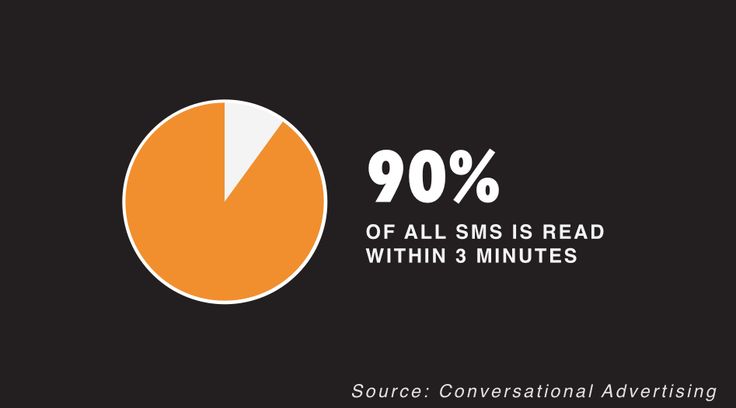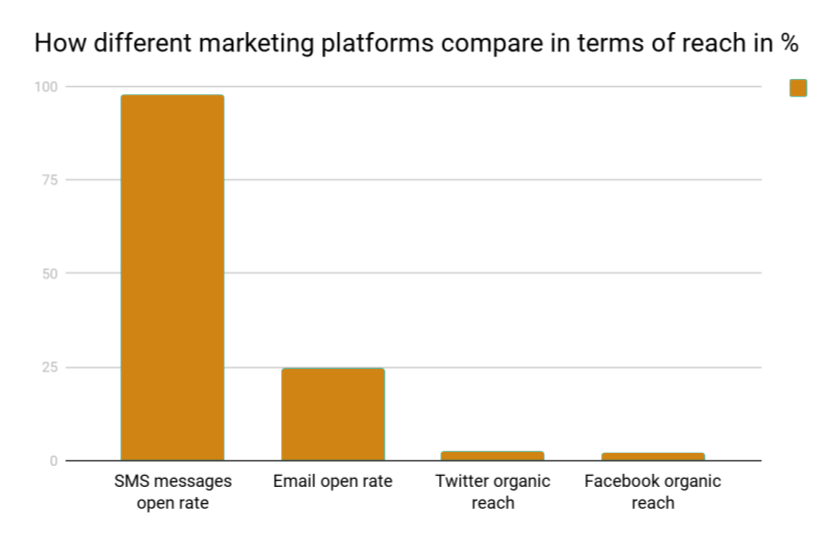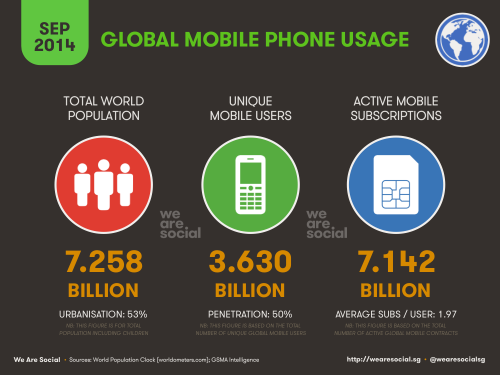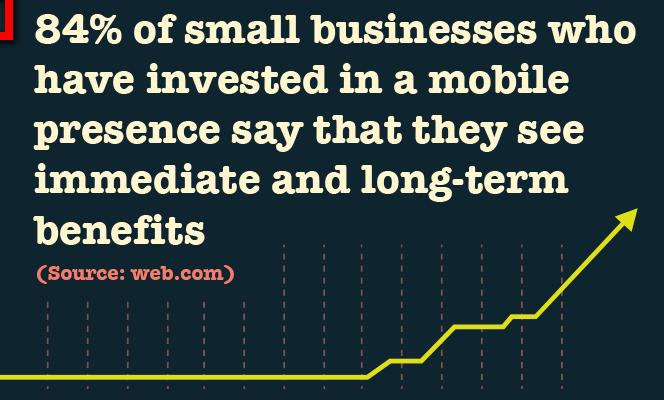With the ever-changing digital landscape, SMS marketing remains an underutilized mobile marketing tactic for most businesses. Let’s find out why?
SMS stands for Short Messaging Service aka Text Messaging. As the name suggests, “It’s the exchange of short messages on mobile devices using phone, web, or mobile communication systems.”
SMS seems to have been around forever and is a great way to interact with friends and family. However, there’s a bit of skepticism around how effective SMS marketing is when it comes to business communications and customer engagement.
Let’s look at some interesting industry benchmarks around SMS marketing to understand the gravity of the situation.

– 75% of people would like to have offers sent to them via SMS
– Mobile offers are redeemed 10x more frequently than print offers
– 50% of those surveyed who received an SMS from retailers, made a purchase as a result (Source: Marketing Charts)
– Sales prospects who are sent text messages convert at a rate 40% higher than those who are not sent a text message.
These are some impressive numbers!
SMS and text messaging are simple, personal, and convenient compared to other forms of communication. So, why is it not a part of your marketing mix?
This may be because of some of the misconceptions about SMS marketing that we all have come across in the past. Let’s consider some myths versus facts to help you make an informed decision about SMS marketing.
Breaking the biggest myths about SMS marketing:
Myth #1. SMS marketing is annoying
Clearly one of the biggest misconceptions out there. It can get annoying when you get spam texts as a customer or when the businesses don’t follow SMS best practices and regulations.
SMS marketing is an opt-in service that requires permission for sending text messages. The percentage of spam in text message marketing is only 1 %, making SMS one of your most legitimate and reliable marketing tools. In fact, 75% of people would like to have offers sent to them via SMS. (source: Digital Marketing Magazine)
With GDPR and privacy protection laws in place, every business needs to get the customer’s consent for any use of their information. Bottom line is, if you adopt SMS best practice to acquire leads, collect their consent, and serve them with relevant messages then it’s much less likely to annoy your audience.
It can be empowering!
Myth #2. SMS marketing is obsolete
The data shows otherwise.
SMS texts have a 98% open rate (Source: Gartner) which makes it the top-performing marketing tactic in terms of reach.

It’s easy to think that SMS is not popular anymore because of other popular apps like Whatsapp, Messenger, Instagram, Snapchat, and so on. However, data shows that 90% of all texts are read within 3 minutes (Source: Conversational Advertising). Also, 72% of business professionals prefer texting to messaging apps.
Honestly, SMS marketing can never be obsolete unless people stop using mobile phones which is highly unlikely given the growing trends around the world.

Myth #3. SMS marketing is expensive and not for small business
A lot of factors are involved with this misconception. It could be the industry you are in, the marketing budgets, the cost of acquiring a lead, return on investment (ROI) ratios, and so on. When you compare the reachability, open rates, response rates, and ultimately the ROI, SMS marketing services really make it a worthwhile investment.

SMS marketing can build huge customer engagement and drive targeted branding and marketing campaigns. Large companies understand the power of SMS marketing and mostly include it in their marketing strategy.
If your SMS texts are highly targeted and relevant with a clear call to action (CTA) then you have the best chance of getting consistent conversions. It’s like laying out any other form of marketing strategy. The fact is, texting a prospect after initial contact increased conversion rates by 112.6%
Of course, you need a savvy text messaging marketing solution to help you run your SMS marketing campaigns successfully.
Now that we have the myths out of the way, let’s look at some of the industries that are making the most out of their SMS marketing activities and building value for their business.
Industries reaping benefits from SMS marketing:
1. Customer Service and Call Center
47% of consumers said that texting could improve their overall satisfaction with customer support. From travel to banking, keep your customers updated on the go by sending them SMS notifications on important information. Improve overall customer experience by integrating SMS with voice, email, and chat solutions.
64% of consumers with texting capabilities would prefer to use texting over voice as a customer service channel. Leverage the high open rates of SMS and request feedback on products or customer satisfaction scores to help improve overall customer support
What’s interesting: 53% of consumers aged 18 to 34 said they’d prefer to use electronic media – email, web, chat, text, or social – instead of the phone for customer support.
Easily build an opt-in database by inviting consumers to sign up via SMS and reduce churn by engaging groups of consumers and segmenting them in a specific category.
For example, accounts that have been inactive for 3 months or more. Leveraging a database to send personalized SMS can make consumers feel even more valued, further reducing churn. Including names, details on products purchased, or places visited can go a long way to increase brand loyalty.
2. Marketing and Media
SMS Marketing is most loved in this industry and we all know why.
SMS is mostly a part of the marketing mix for businesses and brands to engage, promote, and drive results via mobile marketing campaigns. 75% of people like offers sent by text. Promotional tactics like coupon codes, flash sales, VIP events, loyalty programs, and promos are some of the ways SMS marketing is being utilized for generating higher ROIs.
Did you know Coca-Cola spends 75% of its mobile budget on SMS marketing?
SMS is very powerful when it comes to customer engagement and interaction with brands. Mobile offers get redeemed up to 10 times more frequently than print offers. This accounts for both online and offline conversions.
What’s interesting: SMS is being used to create deeper customer engagement and interaction by utilizing polls, contests, and sweepstakes. The customer gets a chance to interact and answer targeted questions to win something in the end. SMS marketing campaigns are opted out of less than 5% of the time thanks to these interactive brand engagements.
3. HR and Recruitment
Recruiters already use text messaging to communicate with candidates, schedule interviews, and send out job alerts. Busy recruiters are organizing their workflows by scheduling a meeting and training session with SMS reaching hundreds of employees with a touch of a button.
What’s interesting: Mobile access allows organizations to create and help empower a more productive, satisfied, and engaged workforce. Links to guides on ‘How to’ via SMS is in use to help support and guide a candidate’s transition during their stressful recruitment processes.
4. Healthcare
The healthcare industry uses SMS marketing more for a branding and customer support solutions. 76% of people worldwide are keen to be reminded of their medical appointments. Health care providers are cutting costs and saving time on appointment reminders, re-schedules, follow-ups, and also reduce no-shows.
What’s interesting: In some recent health care campaigns, SMS has been focused on sending motivational messages, medication reminders, medication side effects, and blood donation information.
5. Hospitality
Hotels and restaurants are increasing their revenue by using SMS to engage customers, increase loyalty, and provide customer service. Booking confirmation messages are one of the most used SMS marketing services in this industry. Apart from that, reservation reminders, cancellations, and check-ins and outs are often carried out using SMS.
What’s interesting: During busy periods, SMS allows businesses and guests to settle bills on the go. Automated messages are sent after a checkout or to follow up pending payments.
6. Education
Schools, colleges, and universities are using SMS to engage and connect better with their students and staff. Research shows that texting students can improve matriculation and retention rates and motivate and inspire students with positive messages.
Also, texting students has a higher engagement rate than email and phone calls. SMS notifications for exam dates, assignments, submissions, closures, event changes, and library book due dates work perfectly to communicate with students. SMS is also being used to communicate with parents and faculty when required.
7. Retail
It’s amazing how major retailers use SMS marketing to increase customer engagement, drive foot traffic to store locations, and generate in-store sales. 32% of SMS retail marketing messages get a response within the first 15 minutes of being received. From sending special offers to customer support messages, retailers know how to use SMS marketing to its fullest.
What’s interesting: SMS surveys and feedback polls tend to get higher response rates which are great for gaining customer insights or reviews to help improve internal workflows. 64% of consumers are likely to have a positive perception of companies that offer communication via text.
8. Transport and Travel
Travel agents and tour operators use SMS marketing for effective customer service and business communications.
SMS texts are great for notifying scheduled changes that may affect travel times, arrivals and departure updates and customer support information.
Final Thoughts:
SMS and text messaging are more simple, personal, and convenient than any other form of marketing.
As the data suggests, SMS marketing is here to stay and its impact is only getting stronger. Both large and small businesses can utilize the power of SMS marketing at different levels in their campaign to drive ROI.
You could never go wrong if you follow these:
– SMS marketing best practices
– acquire customer consent first before sending messages
– bring value to the customer with relevant and highly targeted messages
– always have easy opt-out options within your SMS
This way your messages won’t come across as spammy or annoying.
Major industries like health, customer service, retail, education, transport and travel, recruitment, and media are reaping the benefits of SMS marketing. It’s a great time for you to consider SMS marketing for your business.
Start creating your first SMS marketing campaign with a free Vision6 account.






